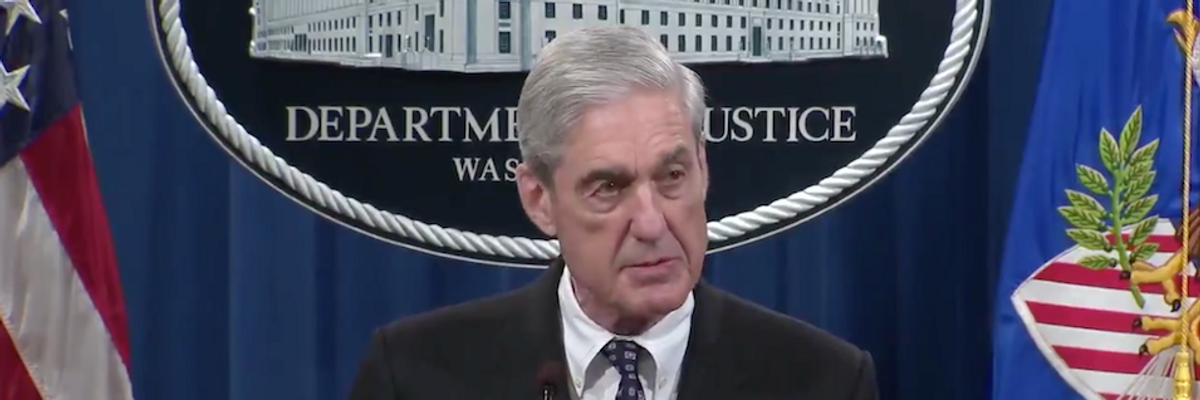On Wednesday, Special Counsel Robert Mueller closed the investigation he was tasked to lead in 2017, announcing the end of the process, and his career, to the public in a 9 minute statement that put the onus for the next step--impeachment--on the House.
Mueller and his team never considered charging the president with a crime, he told reporters, because of DOJ guidelines that state the president cannot be indicted.
As the special counsel pointed out, that leaves the responsibility for holding the president accountable on Congress, the governmental body that has the power to begin impeachment proceedings.
"The Constitution requires a process other than the criminal justice system to formally accuse a sitting president of wrongdoing," said Mueller.
In remarks to the public at the Department of Justice, Mueller said that his investigation found that the Russian military's intelligence operation to disrupt the U.S. election in 2016 worked, but that the Russians and the campaign of then-candidate, and now-president, Donald Trump, did not conspire together.
The president's behavior toward the investigation was less cut and dry. As in the report, Mueller said on Wednesday that his office was less definitive on whether the president committed obstruction.
"Charging the president with a crime was not an option we could consider," said Mueller.
The special counsel also made clear that his report should not then be seen as an exoneration of the president.
"If we had had confidence the president clearly did not commit a crime," Mueller said, "we would have said so."
Impeachment has been a tough sell for House Democratic leadership. Speaker Nancy Pelosi (D-Calif.), as Common Dreams reported earlier in May, has repeatedly expressed hesitation over beginning the process. No Republicans, save Rep. Justin Amash (R-Mich.), have publicly stated their support for hearings.
Wednesday's statement from Mueller may test that level of resistance from Democrats, especially since Mueller is refusing to speak beyond what he's already written in the report if called before Congress.
Political scientist Jeffrey Isaac, in a column for Common Dreams, pointed out that Mueller may not want to testify, but that decision isn't his to make.
"He might not want to testify. He might truly believe that the report is his testimony," wrote Isaac. "But that is not for him to decide."
In a tweet, Sen. Elizabeth Warren (D-Mass.), who is also running for her party's nomination for president, said that Mueller's statement was effectively a call to action.
"It is an impeachment referral, and it's up to Congress to act," said Warren. "They should."
That language was echoed by Sen. Kamala Harris (D-Calif.), one of Warren's rivals in the 2020 race.
"We need to start impeachment proceedings," Harris said in a tweet. "It's our constitutional obligation."
In a statement, CREDO Action co-director Heidi Hess said that Mueller was "practically begging Congress to move forward with impeachment proceedings."
"In a room full of reporters, he explicitly conceded that there wasn't enough evidence to exonerate Donald Trump, a sitting president, on the possible crime of obstruction of justice," said Hess. "In any other year, that kind of earth-shattering finding would be immediate grounds for at least the beginning of an impeachment inquiry, and it's far past time for Congress to step up to its role as a co-equal branch of government and hold Trump accountable for his crimes."
Some House Democrats were signaling their intention to possibly back impeachment proceedings by midday Wednesday.
Rep. Jerry Nadler (D-N.Y.), the head of the House Judiciary Committee, tip-toed right up to the line of calling for impeachment in a statement to NBC News.
"Given that Special Counsel Mueller was unable to pursue criminal charges against the president, it falls to Congress to respond to the crimes, lies and other wrongdoing of President Trump--and we will do so," said Nadler.

